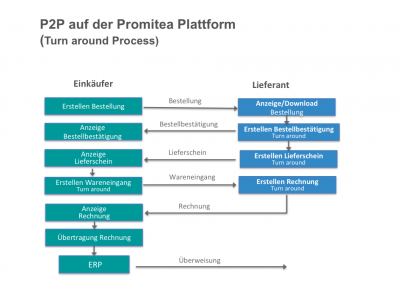Supplementary Modules
Promitea integrates Supplementary Modules into the system that are interconnected with Primary Modules such as SRM, Sourcing and Procurement.
Product Classification
Over the last 20 years, standard classification systems have been established for categories of goods and services. They are arranged hierarchically in a tree structure. The most well known systems are:
- eCl@ss with approx. 50,000 categories, with highest spread in Europe
- UNSPSC United Nations Standards Products and Services Code with also approx. 50,000 categories, used mostly in US and certain industries worldwide
- GPC Global Product Classification for Consumer Packaged Goods
- CPV Common Procurement Vocabulary devoted for public sector
They supplement or replace the conventional product group systems, which are usually proprietary and not as detailed as the classification systems mentioned above. Thus, the buyers and suppliers can’t achieve possible cost cutting effects using more exact product descriptions.
Nevertheless, Promitea is ready to upload and use your product groups to categorize purchasing as you prefer.
If you want to take the path of standardization, we can upload any standard classification system for you and support the transition of your current system to a standard one.
EDI/WebEDI
 The Promitea stakeholders may use electronic messages to exchange information between customer and suppliers to control fulfilment. The EDI message standards such as Edifact, cXML, Oddete and other industry standards are consequently used.
The Promitea stakeholders may use electronic messages to exchange information between customer and suppliers to control fulfilment. The EDI message standards such as Edifact, cXML, Oddete and other industry standards are consequently used.
From 30 years of practical experience, we know that the introduction of "EDI Classic" is time-consuming and therefore preferred in an environment with a high number of orders.
WebEDI is therefore preferred when purchasing high-quality products, as the number of transactions in this sector is relatively low. This also applies to data exchange with smaller suppliers.
WebEDI runs according to the following scheme:
- Once the order (ORDERS in Edifact terminology) has been generated, Promitea displays it in the browser to the supplier.
- The supplier confirms the order with order confirmation (ORDRSP) and notifies the delivery with the delivery note (DESADV).
- The customer confirms the receipt of the delivery with the acceptance report (RECADV).
- The supplier issues the invoice on the basis of the acceptance report (INVOIC).
- The invoice amount is transferred (PAYMUL).
This process speeds up fulfilment at much lower costs and error rates than manual processing by e-mail or fax or even paper documents.
ERP Integration
Much of the data required for the execution of procurement projects has its source in the customer's ERP system. In order to minimize the preparation, execution and evaluation of procurement projects, it is essential to automate the exchange of data between ERP and Promitea.
This includes, for example, the following data:
- Master data of items and suppliers
- Certificates, technical data sheets
- Product catalogs
- Quality assurance data, returns, post-processing costs
- Delivery date, deviations from planned times of deliveries
- Historical data of the project execution
Promitea uses standard formats for these types of data, as long as they are customary in the market, and RestAPI procedures are implemented for data exchange. Promitea offers technical and organizational support for the implementation and testing of these procedures.
Contracts
The usual service agreements are used to ensure the regulated processes between the parties involved. Promitea offers these contracts to the management of organizational framework consisting of the following data formats:
- Meta data is defined and managed in Promitea. For example: Type of contracts, their names, contractual partners, date of conclusion and end of validity, persons responsible for conclusion and maintenance. They are used in all modules.
- Contract contents. The contract texts are generated outside Promitea or taken over and maintained by external sources. Responsibility is held by the technical or legal department or texts are taken from an installed DMS. Promitea takes over this data in a transparent mode.



